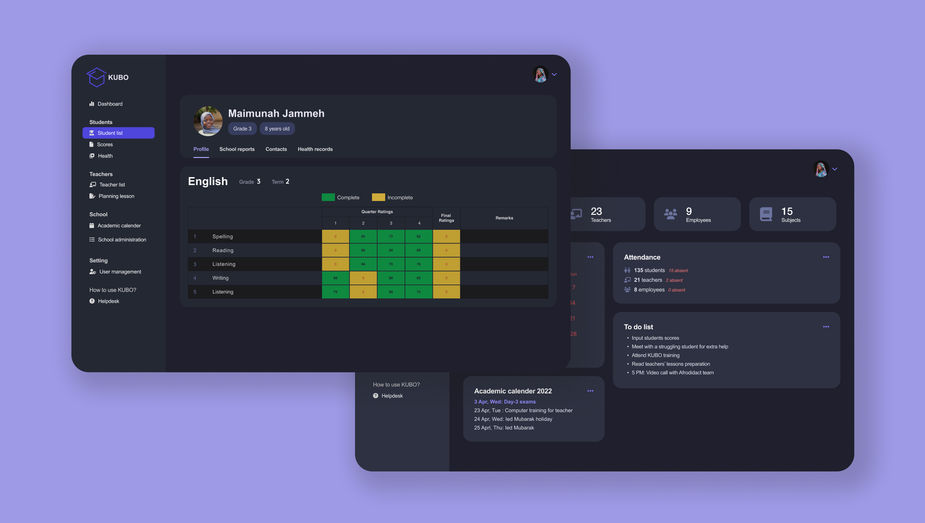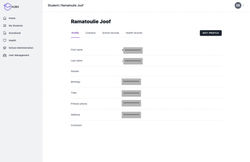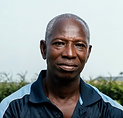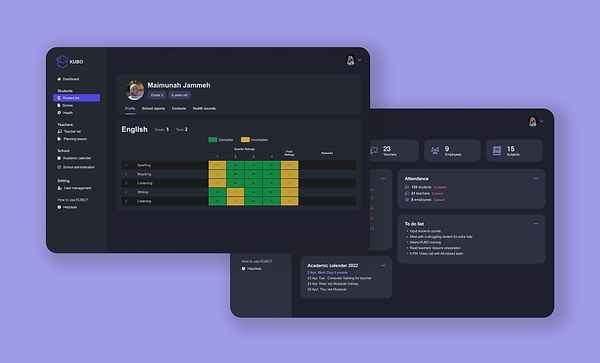.jpg)

A school management software to help teachers in isolated Gambia schools to work more efficiently
2022 • UX research • UX design • UI design
Overview
My volunteering time for KUBO wasn’t just about design project. It was an adventure I’ll never forget. I got a fun opportunity as UX UI Designer to optimize KUBO, a school management software that works without internet connection.
This powerful tool helps teachers and school staff in The Gambia isolated areas to manage and analyze their students' scores and data in more simple and efficient way. Seeing KUBO make a real impact on users day-to-day challenges was incredibly fulfilling. ☺
Outcomes
✔ 3 new features that help school staff working more efficiently
✔ School staffs are less dependent on their colleagues
✔ Design documentation that allows easy handover to developers and a new UX UI Designer.
The current situation
Even when KUBO operates, school staffs are still overwhelmed with some manual tasks
With expensive and weak internet, teachers and school staff in The Gambia have no choice but to rely on paper for almost everything. Manually analyze students' scores, track students' progress, sort students, and manage school administration. Slow and tiring process. Worst of all, when floods occur. It destroyed the written records, adding their frustration.
Though KUBO has eased some challenges especially data entry, teachers and school staff were still overwhelmed with some administrative tasks. Consequently, they still hardly focus on the main task, which is teaching.


Learning activities at Albreda school.
Lack of electricity and internet.


.jpeg)
Some students' scores and school administrations are written manually on paper.
Exploration
Before my visit to The Gambia, Suwaibahtou, the amazing headmaster of The Swallow School shared a worry with me on video call."Our teachers were overwhelmed by manual student sorting". So, I came up with 2 questions in mind:
What categories should be on students' filter feature?
What other tasks that users still do manually and exhaust them?
To dig deeper, I interviewed 4 teachers and 1 headmaster. And guess what? Every single one felt overwhelmed by manual student sorting. They have to put so much effort into sorting students by age, language, and gender. Wheatehr for school activities, events, administrations, and special needs.
Here are the categories they often need to filter:
-
4 teachers need to group students by age
-
3 teachers by language
-
2 teachers by gender
They also struggle with:
-
Manually reviewing school activities to prepare their to-do list
-
Identifying quickly the students with low scores in certain subjects, in order to prepare lessons and extra supports for them
-
Using KUBO software. Some depend on others for navigate
-
Manually analyzing student performance.


Overcome the cultural barriers to get honest feedback
Getting honest feedback from Gambian participants took more time. I compared it to what I experienced with Europeans people in my other projects. I noticed Gambian participants tend to be very polite and might avoid critical feedback, as they see it as rude.
When I tested KUBO with Gambian teachers and a headmaster, they often said everything was good, but they struggled to accomplish tasks. So I slowed down to build trust and create more safe space for open communication. I assured them that honest feedback, even if it was negative, was crucial for improving the platform and making it helpful for their work. Little by little, I got their trust and they were open and honest to give feedback.

Our new normal: chaos
We came to The Gambia with schedules for 14 days. But every day, I laughed at our schedule. Everything ran late. Flat tires, a broken taxi, waiting for another taxis, and the ferry that came late.
Having breakfast was like an adventure. We asked the local where to find a shop and we ended up following him to do his house tour, listening to his family story, and seeing his peacock.
Walking around? It's such expeditions. Some random Gambians followed us and asked for our phone numbers or money. Some nice locals invited us to have tea and chat. The red dust got everywhere: my bag, my clothes, and inside my nose. The proper internet connection we had was in our homestay in the capital city, Serrekunda.
This kind of randomness has become our new normal in The Gambia.

Brainstorm & insights
Back in Belgium with a super-fast internet connection and a fresh brain full of ideas, I dove into the brainstorm.
"How can I design KUBO works good in isolated areas?"
With the constraints KUBO has currently: operates in isolated areas with weak and expensive internet connections, I came up with a question:
Around the same time, I attended a webinar and read some articles about sustainable design in UX UI. It opened my eyes that the sustainable design principle can help me in designing KUBO. It's about creating digital products that are efficient and also accessible in any condition.
The strategy includes:
-
Minimalist design by reducing unnecessary elements, animations, and heavy graphics
-
Dark mode
-
Prioritize essential features: focus on features that truly matter for the users.
These strategies do more than declutter the interface, but also reduce the power consumption, which is crucial in areas with unstable electricity.
Turned out, designing a digital product for isolated areas is not a limitation. For me, it’s a design challenge I’m totally in 💪✨
Solutions & impacts
Based on the user pain points, the insights of the usability test and what users need

I redesigned KUBO platform with dark mode. A change that saves power, which is important in places with limited electricity like the schools in The Gambia.
By using less bright light on the screen, dark mode helps KUBO run longer without draining the battery. And as a bonus, it’s easier on the eyes for users during those long-hardworking hours.
What I learned
✨
Considering the technology limitation
We only have four developers as volunteers, the limited electricity with solar panels, and the unstable internet connection in The Gambia. It takes more time to get information from the school staffs and to develop new features. So, patience is key.
✨
Before going to The Gambia, I often compared my life in Indonesia, a third-world country, to Europe. Indonesia always seemed left behind in education, science, and technology. But when I visited The Gambia, I realized how lucky I was to have had access to technology and a good education from a young age. Even though it may not have been the best, I still had more access than many.
In The Gambia, I met people around 5 to 50 years old who were incredibly happy because we set up computer classes in their villages. It was their first time ever using a computer!
✨
But the harddest part? Seeing how little some locals had. Kids asked for food while we ate. Teachers showed us school toilets that were just a dark room with smelly holes in the ground.
Our mission expanded. From improving the digital platform to raise money to fix basic infrastructure, starting with toilets. Yup, the trip was chaotic, but it was indeed eye-opening and unforgettable. 💕





All pictures and videos were taken by me :)
Currently, KUBO platform is running in The Swallow school in The Gambia.
With the support of the donors, we hope we can expand to another isolated area in Africa. 🤞🏾
✨ Meet our awesome team ✨





























.jpg)











